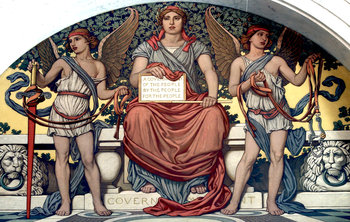
Ownership
Restriction of ownership structures to only allow for employee and/or government owned firms.Freedom
Market socialism doesn't necessarily remove freedoms as aggressively as other flavors of socialism or communism. That is to say, that it would typically allow people to found companies, accumulate wealth and pursue happiness. The primary difference with capitalist freedoms is that you can't hire employees for a wage but must essentially make them partners in your business.Capital
As with capitalism, market socialism allows capital to accumulate in successful firms. However, ownership restrictions would require this capital to go to employees. This would give incentives for firms to have very few employees and to find ways to automate and outsource everything. In other words, employees would find a way to become extremely wealthy such that the upper class would be recreated with a slightly different structure.Markets
Firms would compete in a market to prevent the inefficiencies of a centrally planned economy that tends to produce stagnation, waste, surpluses, shortages and low quality goods.Cronyism
Proponents of market socialism portray government owned firms in glowing terms as "community owned" and envision profits flowing to "the people." The realities of public firms tend to differ markedly from this optimistic view. Within capitalism, close ties between government and firms is simply considered cronyism whereby a few insiders redirect the resources of a society toward their own goals. This is a likely feature of market socialism where public firms are allowed.Competition
Markets require competition to function. Public firms that are funded by a government and have a close relationship with government are very likely to damage competition. Market socialism based solely on employee-owned firms may create significant competition and its fruits such as efficiency and quality.Wage Labor
Market socialism gets rid of wage labor on the assumption that this is "exploitative." Wage labor is an extremely potent economic innovation that decouples labor, capital and risk. Forcing these back into a single package is likely to have unintended consequences.Business Risk
If you get a summer job, you get paid a wage and don't care if your employer is profitable that summer. In other words, you don't have to contribute any capital or assume business risk to profit from your labor. Abolishing wage labor makes everyone an investor who assumes risk. Either this or all risk is shifted to the state, which would create perverse incentives.Mutualism
Market socialism makes different assumptions about human nature than capitalism. Capitalism is based on the profit motive and the idea that people are most motivated and happy when acting in their own self-interest. Market socialism assumes people are motivated to work as a group whereby things are divided equally amongst members without much regard to contribution or merit.Capitalist Realism
Capitalist realism is a type of argument based on the observation that capitalism is overwhelmingly dominant, efficient and productive. For example, the argument that cooperative ownership structures are fully allowed under capitalism but seldom outcompete firms with corporate ownership structures. If wage labor is oppressive and cooperatives are efficient or offer more appealing working conditions -- one would expect mass abandonment of capitalism for cooperatives.Structurally Flawed
Some eloquent solution may exist that gives market socialism advantages over capitalism. However, theories in this area tend to take on an unrealistically glowing tone that glosses over unambiguous structural flaws. As an example of a structural flaw, firms with much capital may have no incentive to hire as they may have to share this capital with each employee. Market socialism requires labor to contribute capital and assume business risk. Alternatively, it requires the state to back all firms potentially creating perverse incentives, cronyism and monopolies.Market Socialism vs Social Market Economy
Market socialism bans wage labor and the most popular and successful types of ownership structures for firms to create an economy where either employees or the state own all firms. This is a mostly theoretical model that arguably contains serious structural flaws.A social market economy is a fully capitalist society that uses taxation and regulations to reduce economic bads and provide public services that reduce poverty and support the working class. This allows individuals to earn a wage without investing capital or assuming business risk. Ideally, a social market economy is an adversarial system whereby the state serves to reduce the excesses of capitalism while using taxation to improve the public good. This is the most common type of society and economy amongst developed nations.| Overview: Market Socialism | ||
Type | ||
Definition | Socialism that is implemented by only allowing government and employee owned firms. | |
Related Concepts | ||




































